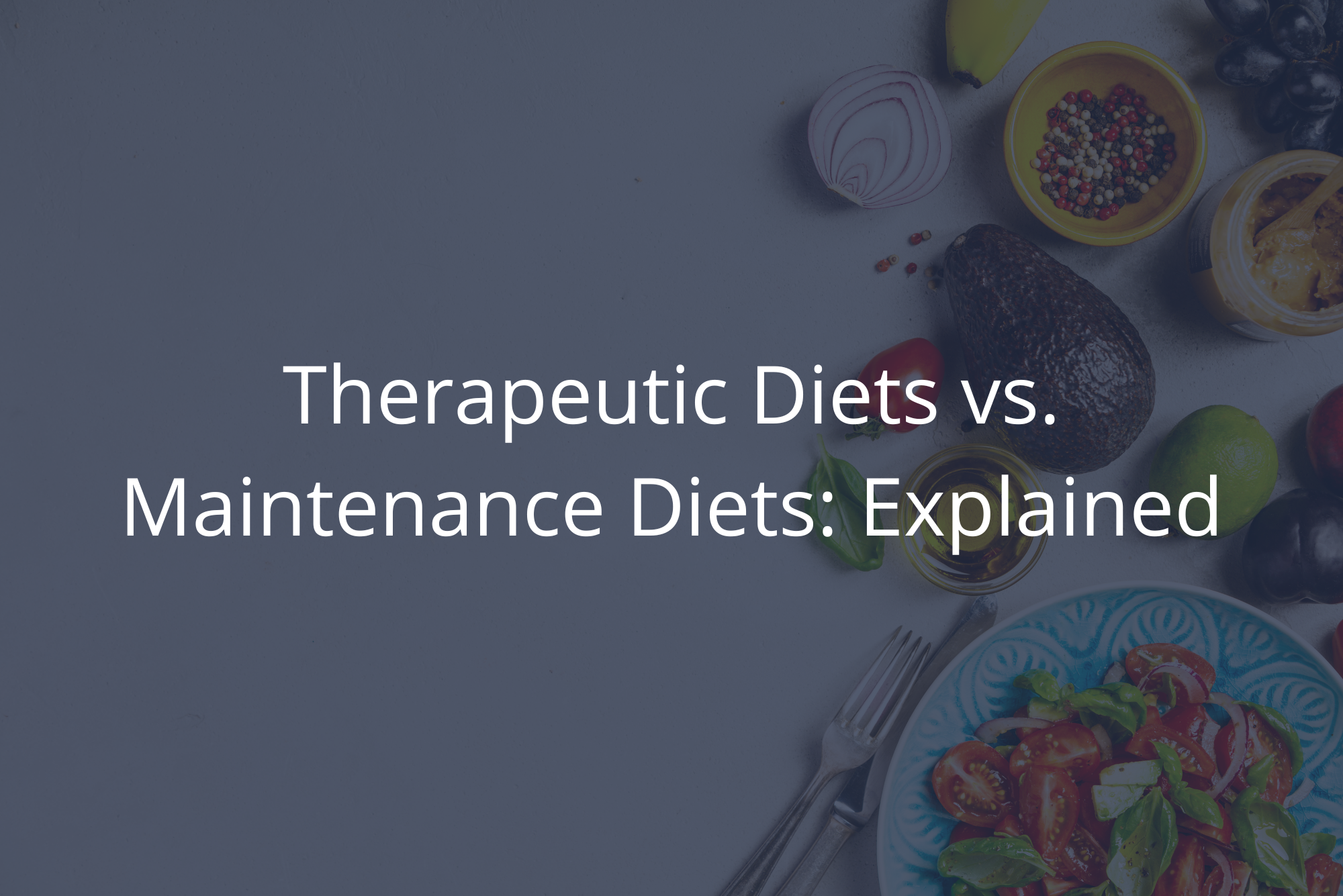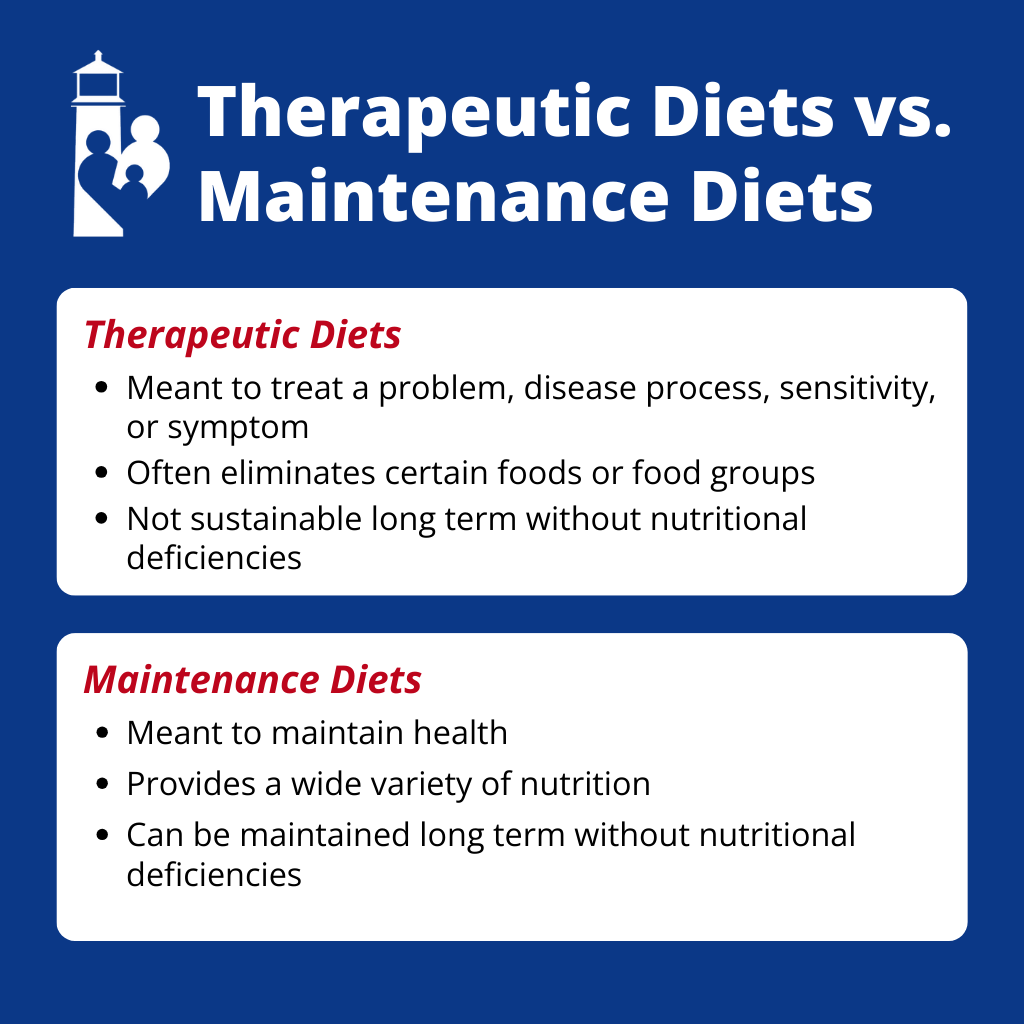
It’s no secret that fad diets get lots of attention in the media. That’s because almost everyone is looking for a magic pill, a silver bullet, or a “hot new” hack when it comes to how to eat.
People frequently ask me what kind of diet they should go on, and my answer is always a question: What’s your goal? Beginning with the end in mind is a great way to sift through the nutrition noise.
Today, we’re going to explore the two main categories all diets fall into: therapeutic diets and maintenance diets.
A therapeutic diet is meant to treat a particular symptom, dysfunction, or diagnosis. The issue might be diabetes, hypertension, stomach ulcers, obesity, bloating, sensitivities — any medical issue that can be helped or hindered by certain foods. Though therapeutic diets get a lot of attention, they’re intended as temporary measures and are more difficult to maintain.
A maintenance diet, on the other hand, is a healthy, varied diet that keeps health in a baseline fashion. Let’s look a little deeper.
Therapeutic Diet Definition
As mentioned, a therapeutic diet is meant to treat something specific, in that it helps to treat a problem, disease process, sensitivity, or symptom.
The great majority of our symptoms are related to our foods. For example, if you have constant stomach irritation and ulcers, perhaps you’re drinking too much alcohol. If you’re always tired, maybe you consume too much sugar, so your insulin spikes, resulting in a rapid rise and then lowering of your blood sugar. A therapeutic diet treats a symptom’s underlying cause.
Therapeutic diets are often elimination diets. They cut out certain foods or certain categories of foods. They sometimes fall into the categorization of “fad diets” — diets that have, for one reason or another, become popular in the media or amongst large groups.
Fad diets aren’t necessarily bad; they may be perfectly legitimate elimination diets. However, they may be applied inappropriately due to their popularity.
Elimination diets, whether fad or relatively unknown, are not typically sustainable. They’re meant to address the underlying cause of a symptom, help your body get back on track, and then end in favor of a healthy maintenance diet. In fact, elimination diets can even harm your health if continued for too long because they eliminate necessary micronutrients from your diet — and sometimes even macronutrients.
Some examples of popular elimination diets include:
- Keto and Atkins: eliminate carbohydrates
- Liquid only: eliminates solids
- Cleanses: various eliminations
- Carnivorous: eliminates vegetables and carbohydrates
- Paleo: eliminates processed foods
- South Beach Diet: eliminates foods with a high glycemic index
Not all therapeutic diets are elimination-based diets. For example, detoxifying diets promote the detox system, and these are for patients who have cancer or infections, whose immune systems really need an extra boost.
Maintenance Diet Definition
Unlike therapeutic diets, maintenance diets provide the variety of nutritional value our bodies need and can be maintained long-term without nutritional deficiencies. This can be best illustrated through examples:
- Mediterranean Diet: High in fruits and vegetables, moderate-to-low carbs, and a fair amount of protein.
- Healthy Diabetic Diet: This could be considered a therapeutic diet because it manages symptoms, but it falls under a maintenance diet because it doesn’t eliminate necessary nutrition. In other words, you could follow this diet your whole life without adverse health effects or nutritional deficiencies.
- Cardio-Metabolic Diet: A varied diet with a focus on preventing and reversing cardiometabolic conditions so rampant among consumers of the standard American diet.
Each of the above maintenance diets varies in its percentages of fats, carbohydrates, and proteins, but all provide the wide-ranging variety so necessary for our bodies’ long-term health.

Therapeutic vs. Maintenance: The Right Diet for You
To help anyone who’s trying to decide on the right diet for them, it’s helpful to begin by considering the differences between conventional and functional medicine. Conventional medicine focuses on organs of the body separately, while functional medicine looks at body systems.
Functional medicine physicians apply this concept to diets. If a patient has a specific issue, a therapeutic diet is important to treat and support the system that needs help.
If a patient lacks specific issues and just wants to optimize their health, we choose a maintenance diet that suits their needs and goals. Are they particularly concerned about heart disease? The cardio-metabolic diet may be a good fit. Do they particularly enjoy fish? Perhaps the Mediterranean diet. A nutritionist can help nail down the specifics of a healthy maintenance diet as well.
For many people in the U.S., the functional medicine cardiometabolic diet may be a good choice because it addresses the root causes of most problems.
Conclusion
When you’re trying to find the best diet for yourself, remember to focus on the outcome. If, for example, you’re choosing a therapeutic diet for weight loss, look at all the problems you’re experiencing and consider potential root causes. Don’t just pick any fad diet; take into account your other concerns and find something that addresses all underlying conditions.
When you’re starting a new therapeutic diet, it’s crucial to focus on the other Pillars of Health as well: sleep, exercise, and stress elimination. This will help optimize your nutrition efforts and progress toward your goal.
Once you reach your goal — which may take up to a year or two — transition to a healthy maintenance diet to maintain the progress you’ve made. This, plus your efforts in the other three Pillars of Health, helps keep you from reverting to the poor state of health that necessitated your therapeutic diet in the first place.

Dr. David Rosenberg
Dr. Rosenberg is a board-certified Family Physician. He received his medical degree from the University of Miami in 1988 and completed his residency in Family Medicine at The Washington Hospital in Washington, Pennsylvania in 1991. After practicing Emergency Medicine at Palm Beach Gardens Medical Center for two years, he started private practice in Jupiter, in 1993. He is an avid baseball fan and Beatles fanatic, since he was 8 years old. He has been married to his wife, Mary, since 1985 and has three grown children.
David completed additional studies at Mercer University, Macon, Georgia and obtained a BS in Chemistry in 1983.
“My interests include tennis, snow skiing, Pilates and self-development.”

